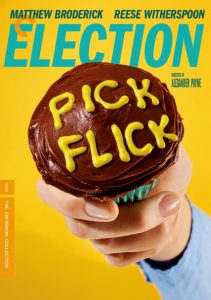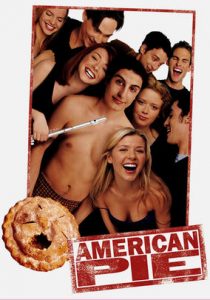Election-1999
Director Alexander Payne
Starring Reese Witherspoon, Matthew Broderick
Scott’s Review #1,225
Reviewed January 30, 2022
Grade: A
Election is a 1999 black comedy film directed by Alexander Payne. He co-wrote the screenplay with Jim Taylor, and it’s based on Tom Perrotta’s 1998 novel of the same name.
Anyone film fan who knows Payne’s work can attest that they are noted for their dark humor and satirical depictions of contemporary American society. His best is About Schmidt (2002), Sideways (2004), and Nebraska (2013).
And Election ranks among his finest works.
The subject matter at hand this time out is politics and education with the familiar Payne setting of Omaha, Nebraska. Right smack in the middle of the American Heartland.
Only his second film, Election stars Reese Witherspoon in her breakthrough role that built momentum toward her becoming a superstar. She is utterly fantastic and this would rank as one of her best roles, if not the best.
And, no, that is not a slight against her iconic portrayal of Elle Woods in Legally Blonde (2001), which I love, but Tracy Flick gets my vote.
The film itself is a masterpiece and has become a cult classic. Payne takes a subject matter, a rivalry between a teacher and student, still considered somewhat taboo. He takes into question authority and tomfoolery and then spins everything around.
Jim McAllister (Matthew Broderick), is a straight-and-narrow, well-liked high school government teacher who notices that successful student Tracy Flick (Witherspoon) uses unethical tactics and manipulation to get exactly what she wants.
Since Jim believes that Tracy has ruined his friend’s marriage he already despises the girl. Though, could he also be in love with her?
When Tracy decides to run for school president, Jim feels that she will be a horrible influence on the student body. He convinces Paul (Chris Klein), a dull but popular student-athlete, to run against Tracy.
When she becomes aware of Jim’s secret involvement in the race, a bitter feud develops between teacher and student as they try to outsmart the other.
The writing in Election is brilliant. The audience may see Jim or Tracy as the villain or perhaps both. They resort to drastic machinations to get their way. Tracy wants to win at all costs while Jim becomes obsessed with ensuring that Tracy does not win.
I love the high school setting and the normal goodie two-shoes Jim resorting to ballot cheating and affairs to best his rival. Tracy is no better as she manipulates and conspires to win the election.
I also worry that the viewers who should see this film either won’t or won’t get the message that Payne is sending.
The editing is flawless and the quick cuts that allow each character a chance to narrate and share their perspective is a major win. We see each motivation and understand what makes each character tick-especially Jim and Tracy.
The acting is wonderful and enough praise cannot be reaped upon Witherspoon and Broderick for their sick and twisted performances. They each radiate desperation and dark comedy and delightful is the perkiness and drive that Witherspoon gives Tracy.
When she bakes cupcakes in the hopes of bribing her classmates for votes, this counterbalances Broderick’s angry and grizzled Jim. He is at war with a student and goes for the jugular instead of being the role model a teacher should be.
It’s delightfully fun though many high school teachers may not appreciate the deviousness.
There’s also a cool LGBTQ+ inclusion which is a positive.
I’d venture to compare Election to American Beauty (1999), made the same year and with a similar tone. Cynical and witty, they both question morality and ethics, especially with the sugar coating of a high school or small-town Americana.
Satire never looked finer in both films.
Made in 1999, how dubious the realization is that Election continues to have relevance as time goes by.
In the current state of United States politics where lying, cheating, and a blatant refusal to accept election results unless one side is the victor is running rampant, and shockingly tolerated by some, Payne’s message has never been more powerful.
Oscar Nominations: Best Adapted Screenplay
Independent Spirit Award Nominations: 3 wins-Best Feature (won), Best Direction-Alexander Payne (won), Best Screenplay (won), Best Female Lead-Reese Witherspoon, Best Debut Performance-Jessica Campbell

